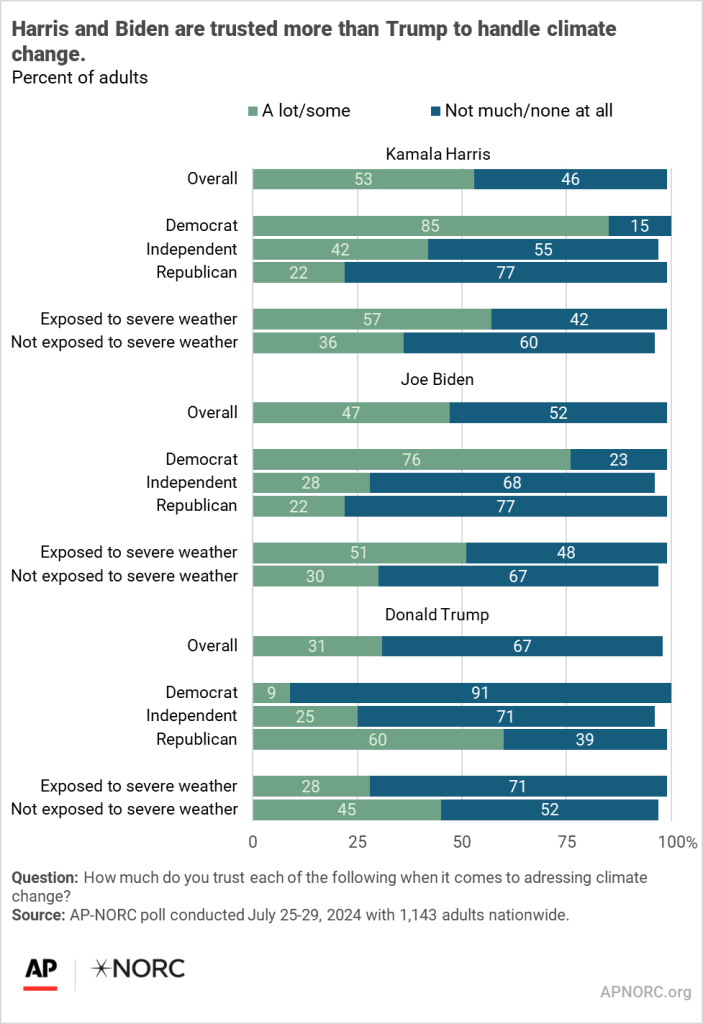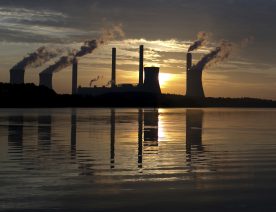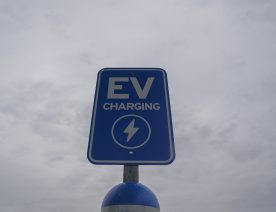
August 7, 2024
With record-breaking temperatures this summer, most adults are experiencing impacts from the extreme heat, including higher electricity bills and disruptions to summer activities and routines.
Four in 10 adults say extreme heat has had a major impact on their electricity bills over the last year, and another 30% say it has had a minor impact. A majority also note that outdoor activities have been affected.
About 40% say extreme heat has impacted their sleep, exercise routine, and their pets.

Yet the intense heat is having a disproportionate impact on some groups. For example, Hispanic (51%) and Black (44%) adults are more likely to say that extreme heat has had a major or minor impact on their sleep than white adults (33%). Nearly half of adults in households making less than $30,000 per year report impacts to their sleep compared to a third of higher income adults.
Democrats are more likely to report impacts from extreme heat than Republicans.
The vast majority of the public reports an impact of extreme weather or weather-related events. Over 80% experienced some sort of severe weather event within the last five years. Extreme heat is most common, affecting 71%, followed by severe cold weather at 34%. These figures are similar to ones from September and April of 2023.
Among the people affected by weather events or natural disasters, 69% say those events occurred, at least in part, because of climate change.

Twenty-two percent of adults have cancelled or changed travel plans because of severe weather events.
About 40% had unexpected expenses on their utility bills due to storms, flooding, heat, or wildfires, while a quarter say their homeowner’s insurance premiums increased. About 1 in 10 adults report unexpected health care expenses because of weather-related issues.
Seventy percent of adults think climate change is happening. Among the rest, 13% say it’s not happening and 18% aren’t sure. Forty-nine percent have become more concerned about climate change in the past year, while 42% say their levels of concern remain unchanged. A similar share of the public felt the same when last asked in April of 2024 and September of 2023.
Sixty-one percent of adults attribute human activity as a cause of climate change, including 41% who believe climate change is happening and primarily driven by human activity.
Most Democrats believe that climate change is occurring and that human activities play a sizeable role. Republicans and independents are less convinced.
Most adults who have experienced a weather event or natural disaster believe climate change is happening and attributable, in full or in part, to human activity. Even when considering the impact of partisanship and other demographics, people impacted by severe weather events are more likely to believe climate change is caused mostly by human activities.

When asked about the government’s role in addressing climate change, 55% of adults want the federal government to do more to reduce it, including most Democrats. Republicans are more likely to say the government is doing too much.

However, wanting the federal government to step up its response to climate change may depend on who’s in the Oval Office. About half the public trusts Kamala Harris and Joe Biden to address climate change. A third find Donald Trump trustworthy on the issue. Democrats have more trust in both Biden and Harris than Republicans have of Trump.
Again, exposure to severe weather relates to attitudes on how the government should respond to climate change and who is trustworthy to do it. Even when controlling for partisanship, those who have experienced any sort of severe weather within the past 5 years are more trusting of Biden and Harris, while those who have not experienced any severe weather events place more trust in Trump.

About two-thirds of adults feel that climate change is having a negative impact on the country and world, and 40% are experiencing a negative impact personally. Democrats are more likely than independents or Republicans to feel climate change is negatively impacting the world, the country, or their own lives.

When asked how they feel when they think about climate change, people are most likely to feel anxiety followed by anger.

Democrats are more likely than Republicans or independents to feel angry, anxious, or motivated by climate change. Adults under 30 are more likely to feel anxious than those 60 years or older (38% v. 22%). Black adults tend to feel more motivated (32% v. 15%) and hopeful (25% v. 10%) than white adults.
The nationwide poll was conducted July 25-29, 2024 using the AmeriSpeak® Panel, the probability-based panel of NORC at the University of Chicago. Online and telephone interviews using landlines and cell phones were conducted with 1,143 adults. The margin of sampling error is +/- 4.1 percentage points.
Suggested Citation: AP-NORC Center for Public Affairs Research. (August 2024). “Extreme heat is impacting most Americans” https://apnorc.org/projects/extreme-heat-is-impacting-most-americans/







